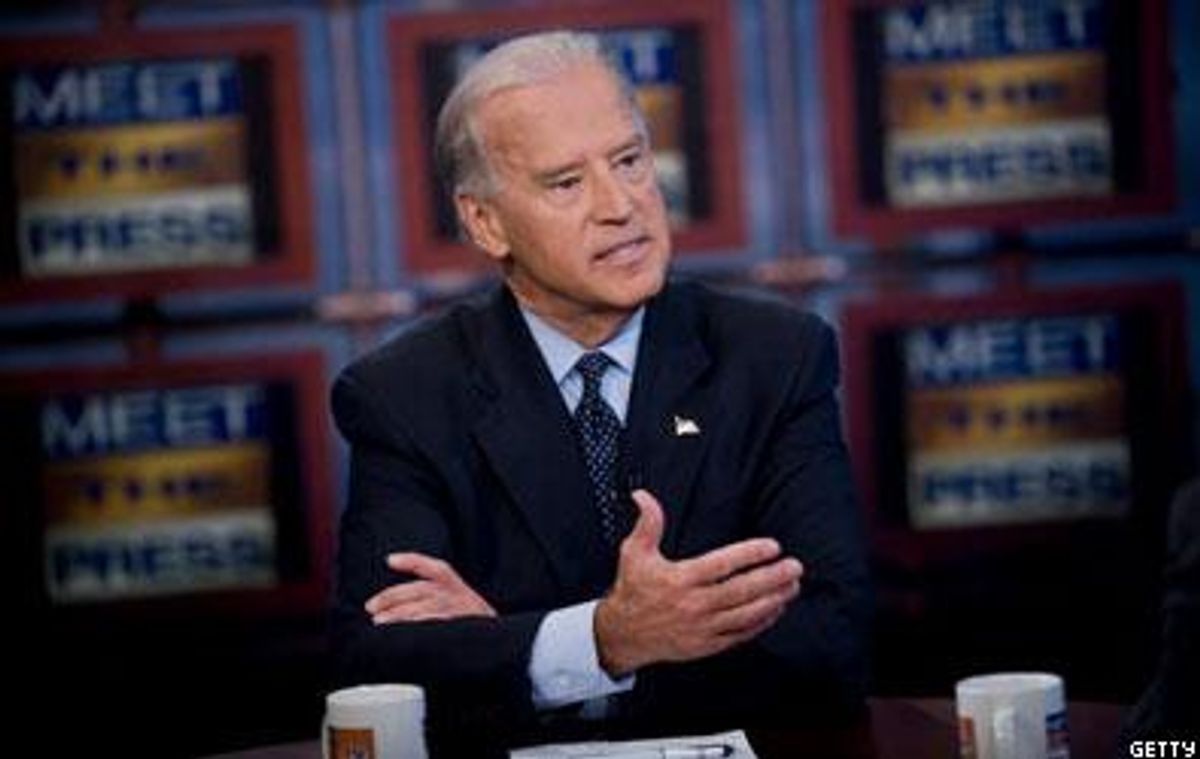As one of the
most anticipated announcements in recent political history
dragged into late August, there was no shortage of debate
over whom Democratic presidential nominee Barack Obama
should choose as his running mate. Among the top
contenders was Virginia governor Tim Kaine, who's
shown a tepid approach to gay rights, and Evan Bayh, an
Indiana senator with stronger equality credentials but
a reputation for blandness. (New York senator Hillary
Clinton was a serious long shot, though a choice that
former New York City mayor Rudy Giuliani subsequently deemed
a "no-brainer.")
When Obama
finally did reveal his vice president -- via text message at
3 a.m. on August 23 -- it wasn't hard to see
that Delaware senator Joseph Biden Jr. was the better
pick in terms of gay rights than either Kaine or Bayh.
While he may not be a trailblazer, Biden has a solid record
on gay issues, which is augmented by his considerable
experience, outspokenness, and reputation.
Since first being
elected to the U.S. Senate in 1972 (at age 29), Biden
has demonstrated a consistent commitment to equality in
general, which he often expressed through influential
positions as chairman of the Foreign Relations
Committee and chairman of the Judiciary Committee. He
opposed the nomination of Clarence Thomas to the
Supreme Court in 1991, authored the Violence Against
Women Act in 1994, and recently helped broker passage
of the President's Emergency Plan for AIDS Relief,
which includes a provision to repeal the travel and
immigration ban on HIV-positive people.
Gay leaders from
his home state hail Biden. "He's extremely
well-respected," says Emily Falcon, a Democrat who
became the first openly gay delegate from Delaware
elected to a national political convention in 2004.
"We feel lucky to have such a nationally known figure
and a Delaware icon representing our issues so well and so
thoughtfully in Washington, D.C."
"I know
that Joe is very fair," adds Bob Martz, president of
the Delaware Liberty Fund, a nonpartisan political
action committee focused on LGBT issues. "I
feel comfortable that if he were asked, he would support
many of our issues."
And there are
statistics to back up the praise, specifically
Biden's 84% average on nine congressional
scorecards issued by the Human Rights Campaign since
1989. In addition, Biden was cosponsor of the Matthew
Shepard Local Law Enforcement Hate Crimes Prevention Act in
2007, and he supports transgender inclusion in the
Employment Non-Discrimination Act. In 2006 he opposed
the constitutional amendment to ban same-sex marriage,
calling it nothing more than a political distraction.
"Because we don't want to make any hard
decisions," he said on NBC's Meet the
Press at the time, "let's go talk
about gay marriage. I think it's ridiculous."
Biden did,
however, vote for the Defense of Marriage Act in 1996; he
says he supports federally recognized civil unions
that grant same-sex couples the same legal rights as
marriage. Nevertheless, when Fox News asked him in
2003 whether he believed gay marriage was inevitable, the
senator replied, "I think it probably
is."
With his mix of
gravitas and garrulousness, Biden appears adequately
armed to lead a repeal of the U.S. military's
"don't ask, don't tell" ban
on openly gay service members. He opposed the
policy's codification in 1993, when it was
championed by then-senator Sam Nunn. Biden continued to
voice his dislike of the policy during a presidential debate
in New Hampshire in June 2007. "Let me tell you
something," he said. "Nobody asked
anybody else whether they're gay in those foxholes,
number one."
Immediately
following the debate, the then-presidential candidate
told The Advocate that if he were elected, he
would simply end the antigay military policy.
"I would issue an executive order saying there
will be no discrimination whatsoever in the military and
everybody will be held to the uniform military code --
so that if two gay people engage in illicit activity
on the base, they're gone. Just like if two married
people engage on the base, they're gone."
While his
enthusiasm may be appreciated, "don't ask,
don't tell" is a law enacted by
congressional vote and presidential signature, so its repeal
would likely not be possible by executive order, says
Nathaniel Frank, senior fellow at the Palm Center, a
research organization at the University of California,
Santa Barbara. Instead, it would begin in Congress,
where Biden, currently the sixth longest-serving senator,
has already proven his mettle.
"Senator
Biden has a long history of being a reliable expert on both
foreign affairs and the armed services, which go hand in
hand in the Congress," says Steve Ralls, former
communications director for Servicemembers Legal
Defense Network and a leading authority on the
military ban. "Throughout his tenure, he has
developed important relationships and has garnered the
respect of many key people who would be important
influencers in the campaign to repeal 'don't
ask, don't tell.' "
In a campaign
season marked by promises of renewed hope and trust, Barack
Obama may have delivered with Joe Biden.


















































































